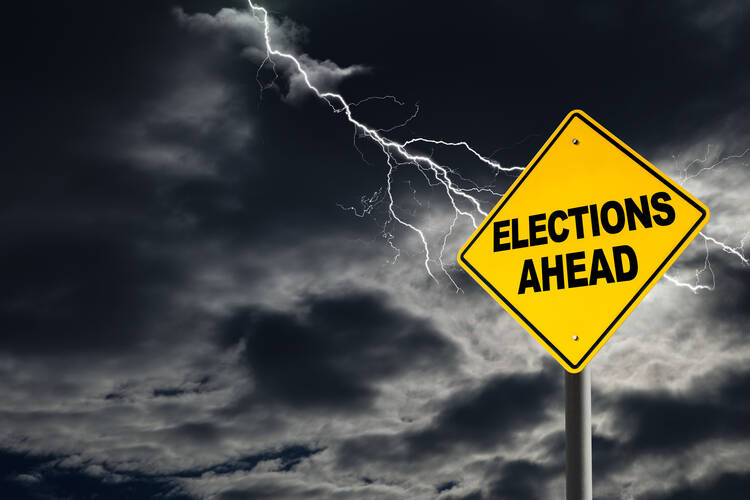In the last week before an important election, it is tempting to write a grand summary of the issues at stake, to make a final attempt to influence the outcome—to “give it, give it all, give it now,” as Annie Dillard once advised writers. But only 5 to 15 percent of Americans decide how to vote in the last week before an election, so not many of you are still weighing your options. Instead, I thought it would be helpful to give some tips to everyone on getting through Election Day and beyond without adding to the toxic atmosphere out there.
Read some fiction or poetry. You are not required, as a responsible citizen, to spend all of your time agonizing over the here and now. Instead of watching the polls, or seeing what is trending on Twitter, you can find solace in the universal and the timeless. You can read Scripture. You can also visit the inner lives of recognizably human characters in well-crafted fiction, as opposed to the superficial and predictable characters who populate the so-called reality of political journalism.
Pace yourself. Don’t overdose on political news thinking that it will all be over soon.
As the novelist Liam Callanan once wrote in America, “Fiction moves us, engages us, finds for us truths we may not have recognized when first presented to us as fact.” It also “teaches us empathy—with characters whose lives lie far beyond our own, or are so eerily similar they seem identical.” How many recent news stories have taught you empathy?
Read things that make you angry about injustice. But don’t read things that simply make you angry that other people don’t share your political views. To put it another way, a sad read can inspire you to do some good in the world. A “hate read” only feeds a perverse desire to assure yourself that most people are too stupid to care about.
Don’t pigeonhole people. Polls can illuminate the political behavior of certain demographic groups, but beware of generalizations that may not apply to your individual neighbors, co-workers or distant relatives you only see on Facebook. Don’t assume you know how someone is voting because of their gender, age, skin color, ethnicity or level of education. Don’t lecture anyone about how they are voting against their own best interests (or what you perceive to be their best interests).
Avoid sarcastically saying “Well, I guess you’re happy” to anyone you meet the day after the election.
Avoid sarcastically saying “Well, I guess you’re happy” to anyone you meet the day after the election.
Check your self-absorption. The political outcome that is best for you—financially, psychologically, spiritually—is not necessarily what is best for the country as a whole. Remember that no one’s personal needs align exactly with the common good.
Keep your temper under control. Give your fellow citizens some slack. Listen before lecturing. You won’t change minds by starting a rant with “You’re obviously racist, sexist and xenophobic. But now that I have your attention, I’d like to talk to you about how you can vote to save democracy.”
Don’t drag God into your political fights. God didn’t write the Constitution, and he doesn’t control elections. But if you scoff at someone for saying that God wants one side to win, don’t follow up with “Of course, if Jesus had to vote in this election, he would obviously vote the way I do.””
On Election Day, don’t jump to conclusions. Take anything you read on Election Day with a grain of salt. Journalists can feel the need to supply content while waiting for election results, but Election Day anecdotes and rumors are often debunked or are contradicted by actual vote tallies.
First, exit polls are frequently wrong or misleading. (Coming out of a voting site once, I made a beeline for a woman with a clipboard, correctly surmising that she was looking for exit poll respondents, and she eagerly started asking me questions. I don’t think that poll really used a random sample.) Also, reports of extraordinarily high turnout often turn out to be limited to certain towns or neighborhoods; it can take longer to determine that turnout is actually down statewide. And there are always a few instances of polling places with machines that don’t work, . but it can take weeks to determine whether there are more problems than usual.. (Voter intimidation is another concern, but, again, “real time” tweets and videos can be wrong or misleading.)
Pace yourself. Don’t overdose on political news thinking that it will all be over soon. Counting this year’s votes may take weeks, and even official results may be in doubt because of lawsuits challenging election rules (more than 100 had already been filed two weeks before Election Day). And if the Republicans take control of the House, we may not get much of a break before politics returns to the front page: There is already talk of impeachment proceedings against President Biden and officials in his administration.
Next column: Who are the frontrunners in the 2024 presidential election? (Just kidding, probably.)








